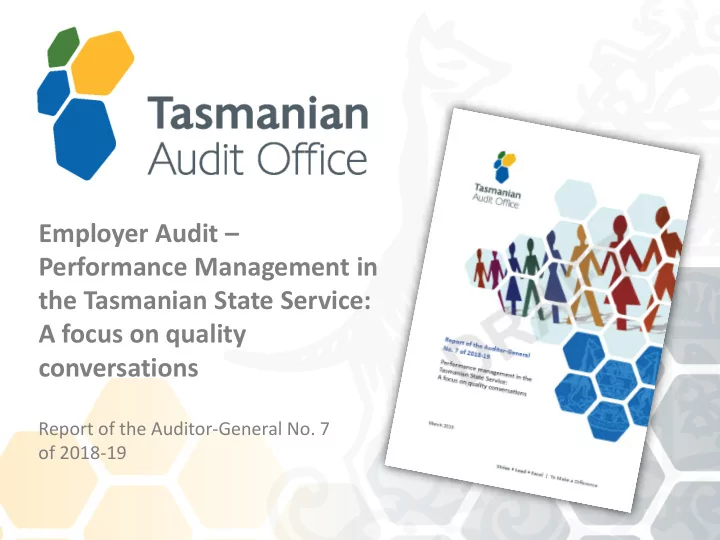

Employer Audit – Performance Management in the Tasmanian State Service: A focus on quality conversations Report of the Auditor-General No. 7 of 2018-19
Objective To evaluate the effectiveness of the performance management in the Tasmanian State Service with a specific focus on the effectiveness of performance and development conversations between managers (including supervisors) and employees that form the basis for providing and receiving feedback. 1
Scope • Covered the following agencies: – Department of Communities Tasmania – Department of Education – Department of Health – Department of Justice – Department of Premier and Cabinet • This accounted for approximately half the number of Tasmanian State Service employees. 2
Framework • Existing model – Employment Direction 26 - Managing Performance in the State Service (ED 26) • This was not a compliance audit against ED 26, as it is currently under review • The Auditor-General formed an opinion through seeking feedback on quality of conversations, as well as the broader framework through a staged methodology. 3
Audit Approach Mix of agencies, business units, managers/ supervisors, regions. Provided in-depth Focus discussion on issues raised in survey groups Survey Based on audit sub-criteria, (all in-scope 21% response rate agencies’ staff) Initial assessment from Interviews experts on the ground (human resources leaders) Desktop review: strategies, policies, tools and templates 4
Audit Criteria Is there a shared understanding Are managers and Is there shared between managers employees ownership and and employees on equipped to engage accountability for the purpose of in performance and the performance performance and development management development conversations? process? conversations? Are the principles Do employees and and foundational managers engage elements of the in quality broader performance and performance development management conversations? framework effective? 5
Findings 1. Is there a shared understanding between managers and employees on the purpose of performance and development conversations? • Managing performance and managing development seen as distinct exercises • Perception by employees that performance management means managing underperformance • Disconnect between managers and employees over the emphasis on either how outcomes are achieved, or what outcomes are achieved 6
Findings 7
Findings 1. Is there a shared understanding between managers and employees on the purpose of performance and development conversations? • 62% of survey respondents agree that performance assessments consider behaviours and capabilities • Employees motivations: 8
Findings 2. Are managers and employees equipped to engage in performance and development conversations? • Agencies generally not assessing the effectiveness of conversations, focus is on whether they took place 9
Findings 2. Are managers and employees equipped to engage in performance and development conversations? • Training materials developed separately by agencies, and therefore not consistent 10
Findings 3. Is there shared ownership and accountability for the performance management process? • Two key foundational elements are in place: 11
Findings 3. Is there shared ownership and accountability for the performance management process? • Performance outcomes cannot always be relied on to determine salary progression due to perceptions of unfairness, rigid focus on templates, methodology not supportive of a personal approach and inability to influence tangible outcomes • Although it was generally found that conversations do result in agreed actions, the follow up of those actions was not considered effective 12
Findings 4. Do employees and managers engage in quality performance and development conversations? • Mixed evidence of explicit reference to fairness within agency performance and development policies • Time and capacity impact on conversations: • Two-way feedback was not embedded in the performance and development process 13
Findings 5. Are the principles and foundational elements of the broader performance management framework effective? • Focus on compliance rather than employee development 14
Findings 5. Are the principles and foundational elements of the broader performance management framework effective? • Managers believe performance and development conversations are occurring more frequently than employees do • 80% of employees agreed conversations were occurring more than annually • Difference in perception between managers and employees in what constitutes a performance and development conversation 15
Audit Conclusion Foundational elements are in place for agencies to conduct performance and development conversations. The framework is partially effective but requires a greater investment by agencies in policies, training, technology and quality review to remove current barriers to achieving more effective performance and development conversations. 16
Recommendation That each agency undertakes a self-assessment against the possible agency responses listed in this report, to establish a clear understanding of the extent to which activities are already being undertaken within the agency, as well as whether that response is appropriate for their needs. Once the self-assessment is complete, agencies should each develop a plan for implementation that links to their own level of organisational maturity and complexity and takes into account their resourcing priorities. 17
Comments received Secretary DPAC, on behalf of all audited agencies I was pleased to note that the Report focuses on improving quality conversations and our overall approach to performance management, rather than focusing on compliance with the current performance management procedures. The Report provides a performance audit on the effectiveness of performance conversations between managers and employees that form the basis for providing and receiving feedback. The Report therefore provides an opportunity to advance the maturity of agencies’ approach to performance management. 18
19
Recommend
More recommend